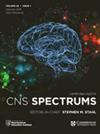Problems and innovative approaches in student management in universities: focusing on students with autism as the core
IF 3.4
3区 医学
Q2 CLINICAL NEUROLOGY
引用次数: 0
Abstract
Background Students with autism have unique characteristics in social interaction, emotional management, and learning styles, which may be overlooked in the larger environment of universities and affect their learning and life. Therefore, from a psychological perspective, exploring the problems and innovative approaches in student management in universities, with a focus on autistic students, has important theoretical and practical significance. Subjects and Methods The subjects of this study were 206 college students studying at a certain university, all of whom had varying degrees of autism. These students were equally divided into an experimental group and a control group. The experimental group conducted innovative management based on the management innovation pathways collected through expert surveys, while the control group only managed in traditional ways. The management experiment lasted for 60 days. Before and after the experiment, each group of students needs to be tested with the Autism Behavior Checklist (ABC). Results The experimental results showed that there was no significant difference in any baseline data between the two groups before the start of the experiment, and there was no significant difference in ABC scores. After the experiment, the total ABC scores of the experimental group and control group students were 33.6 ± 2.9 and 42.2 ± 3.1, respectively, with lower scores and significant differences in the experimental group. Conclusions The expert group members found that managing college students through multiple innovative university management methods that focus on students and balance humanization and institutionalization can help improve the symptoms of students with autism.高校学生管理存在的问题与创新途径:以自闭症学生为核心
自闭症学生在社会交往、情绪管理、学习方式等方面具有独特的特点,这些特点在大学大环境中容易被忽视,影响到他们的学习和生活。因此,从心理学的角度探讨以自闭症学生为中心的高校学生管理中存在的问题和创新途径,具有重要的理论和现实意义。研究对象与方法本研究以某大学206名患有不同程度自闭症的大学生为研究对象。这些学生被平均分为实验组和对照组。实验组根据专家调查收集到的管理创新路径进行创新管理,对照组仅采用传统方式进行管理。管理试验为期60 d。在实验前后,每组学生都需要接受自闭症行为检查表(ABC)的测试。结果实验结果显示,两组在实验开始前的任何基线数据均无显著差异,ABC评分也无显著差异。实验结束后,实验组学生的ABC总分为33.6±2.9分,对照组学生的ABC总分为42.2±3.1分,实验组得分较低,差异有统计学意义。结论专家组成员发现,通过以学生为中心,兼顾人性化和制度化的多种创新大学管理方式来管理大学生,有助于改善自闭症学生的症状。
本文章由计算机程序翻译,如有差异,请以英文原文为准。
求助全文
约1分钟内获得全文
求助全文
来源期刊

CNS Spectrums
医学-精神病学
CiteScore
6.20
自引率
6.10%
发文量
239
审稿时长
>12 weeks
期刊介绍:
CNS Spectrums covers all aspects of the clinical neurosciences, neurotherapeutics, and neuropsychopharmacology, particularly those pertinent to the clinician and clinical investigator. The journal features focused, in-depth reviews, perspectives, and original research articles. New therapeutics of all types in psychiatry, mental health, and neurology are emphasized, especially first in man studies, proof of concept studies, and translational basic neuroscience studies. Subject coverage spans the full spectrum of neuropsychiatry, focusing on those crossing traditional boundaries between neurology and psychiatry.
 求助内容:
求助内容: 应助结果提醒方式:
应助结果提醒方式:


